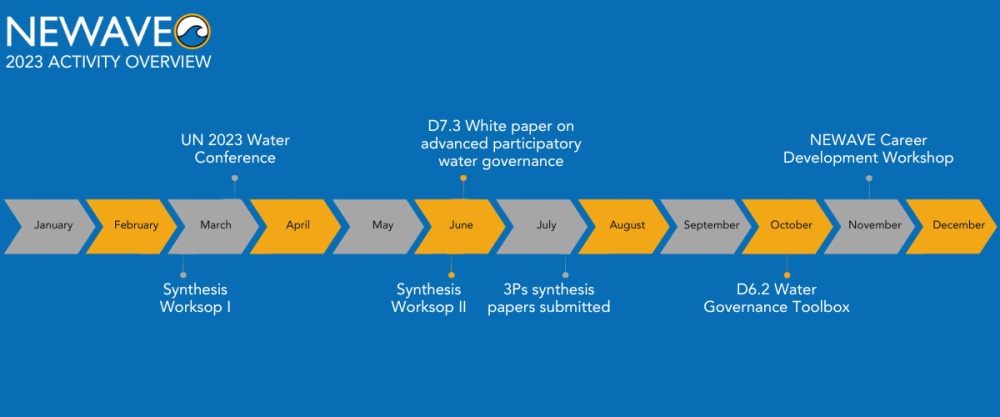NEWAVE 2023: A short overview

As we are nearing the end of the year, we look back at 2023 and re-visit our milestones. Our network organized several workshops and participated in high-level events. At the same time, NEWAVE released numerous actionable outputs and has been steadily working on interactive water governance products soon to be launched. Over the past months, our Early-Stage Researchers completed some of their doctoral publications and related outputs. We kindly invite you to read our reflection on 2023 and learn more about the upcoming final chapter of our project.
Spring 2023
The beginning of the year began with two important events. NEWAVE organized a network-wide Synthesis Workshop which took place in Amsterdam in early March. The objective of this workshop centered around advancing the synthesis work based on collaborative work and individual ESR projects, discussing NEWAVE’s actionable products, recommendations, and lessons learned relevant for different stakeholders, and looking ahead towards the future of the network.
Later in the same month, NEWAVE had the opportunity of participating in the UN 2023 Water Conference held between 22 and 24 March. Several of NEWAVE network members arrived in New York, including 5 of our Early Stage Researchers. Our network held two virtual side events during the conference, which focused on the themes of governance in contentious socio-hydrological contexts and reflexivity in research practices in water governance. You can watch the recordings of the two sessions below:
22 March, 2023 | “Rival waters: governance in contentious socio-hydrological contexts”
24 March, 2023 | “Overcoming Obstacles for Reflexive Research Practice in Water Governance”
Moreover, NEWAVE, as an accredited organization, was invited to submit comments to the Conference, which were published in the following statement.
You can read more about our reflection on the event in the following blog pieces:
- UN2023 Water Conference: A house for water? by Emanuele Fantini
- ESR-Reflections on the UN Water Conference by Gina Gilson, Dona Geagea, Hannah Porada, Sinafekesh Girma Wolde, Radhika Singh
- Risky choices ahead - IVM statement on the UN 2023 Water Conference by Johanna Koehler
- Which key themes emerged during the 2023 Water Conference? by Paulina Raniecka
Summer 2023
In early summer, NEWAVE members met in Brussels to attend Synthesis Workshop II. Three objectives were set for this meeting: to debate the future of water governance; to discuss NEWAVE findings relevant for policy, practice, and communities; and to support career development, mentorship, and network building.
By the end of July, our 3Ps working groups (Problématiques, Patterns, and Paradigms) submitted their synthesis papers to the European Commission. The publications were the culmination of 2 years of iterative work to unravel the following overarching and interrelated research questions (RQ):
- Problématiques: (RQ1) What are the most important contemporary water-human problématiques?
- Paradigms: (RQ2) How do paradigms arise, circulate and impact water governance applications?
- Patterns: (RQ3) What patterns of governance are prevailing in the global water governance arena and what are their outcomes?
We will share these papers as soon as they will be published. Make sure to follow us on our social media platforms to stay up to date!
NEWAVE, under the lead of our host institution Fundación Nueva Cultura del Agua, published a high impact deliverable D7.3 White paper on advanced participatory water governance. This report focuses on the interface between science and policy, understood in this context as the relationship between knowledge and policy-making for an advanced participatory water governance. The content of this deliverable is built upon the experience of those working in the interface between academia, civil society and policy. It does not aim to provide broad ranging prescriptions on the interface between knowledge and policy making, but rather it is a context- and experience-based reflection on the ways that different kinds of knowledge – in a true transdisciplinary sense – can be articulated to interact and inform policy decisions in the field of water governance. We invite you to read the full deliverable here.
Autumn 2023
After summer, several work groups have begun their activity towards actionable products. The Water Governance Interactive (WGI) Atlas task force has been collaborating with IT developers on the creation of an online atlas that can showcase the doctoral work of the NEWAVE ESRs. The MOOC task force took the first steps towards the creation of an open course on water governance themes, while the documentary team has begun shaping the content and design of a visual report of the NEWAVE journey. We are thrilled to share that all these outputs will be launched and presented during the final conference for our project taking place in April 2024.
In a similar vein, the management team synthesized the methods and analytical tools used by the NEWAVE ESRs. The result of this process is the Water Governance Toolbox – a deliverable intended as a collection of resources for water governance research, including methods, approaches, and analytical tools. In order to develop this toolbox NEWAVE leveraged the work of the 15 PhD projects that are being conducted by the NEWAVE Early Stage Researchers (ESRs) and their supervisory teams. This report is currently being translated into an interactive tool that will constitute a component of the NEWAVE WGIAtlas.
Winter 2023
Approaching the end of their PhD journeys, early-stage researchers often face the struggles of jumping into their next career step. For this reason, NEWAVE and the 15 Early Stage Researchers (ESRs) organized a Career Development Workshop. The workshop was intended as a safe space for the ESRs to reflect on their next career goals, share their concerns and uncertainties about the future and hear the life experiences of researchers and experts in the water sector, as well as consider how NEWAVE is positioned to support them in this transition. You can read more about the event here.
We are also thrilled to announce the upcoming Special Feature “The Next Wave in Water Governance” in the Ecology & Society Journal. A persistent suggestion coming from different scholars and practitioners is that the current water crisis is primarily a “governance crisis” (see for instance: OECD, 2011). Addressing them requires a critical reflection on the development of founding ideas (norms, goals) for governing and the organizations, rules, and policies that underpin interventions. Ideally, reflections should provide guidance for the future development of water governance ideas that are sensitive to the context. To enrich these reflections and pave the way for incisive debates about the water governance of the future, this Special Feature invites contributions from diverse epistemic and ontological approaches from all parts of the world, and with various geographical focuses and methodologies. Stay tuned for more information on this opportunity!
We are excited to begin the final chapter of our NEWAVE journey. 2024 will bring many exciting initiatives and outputs. We are at the initial stage of planning the final NEWAVE Conference where we will be presenting several actionable deliverables, including the Water Governance Interactive Atlas (WGIAtlas), Water Governance Toolbox, Water Governance MOOC (Massive Open Online Course), and the NEWAVE documentary.





